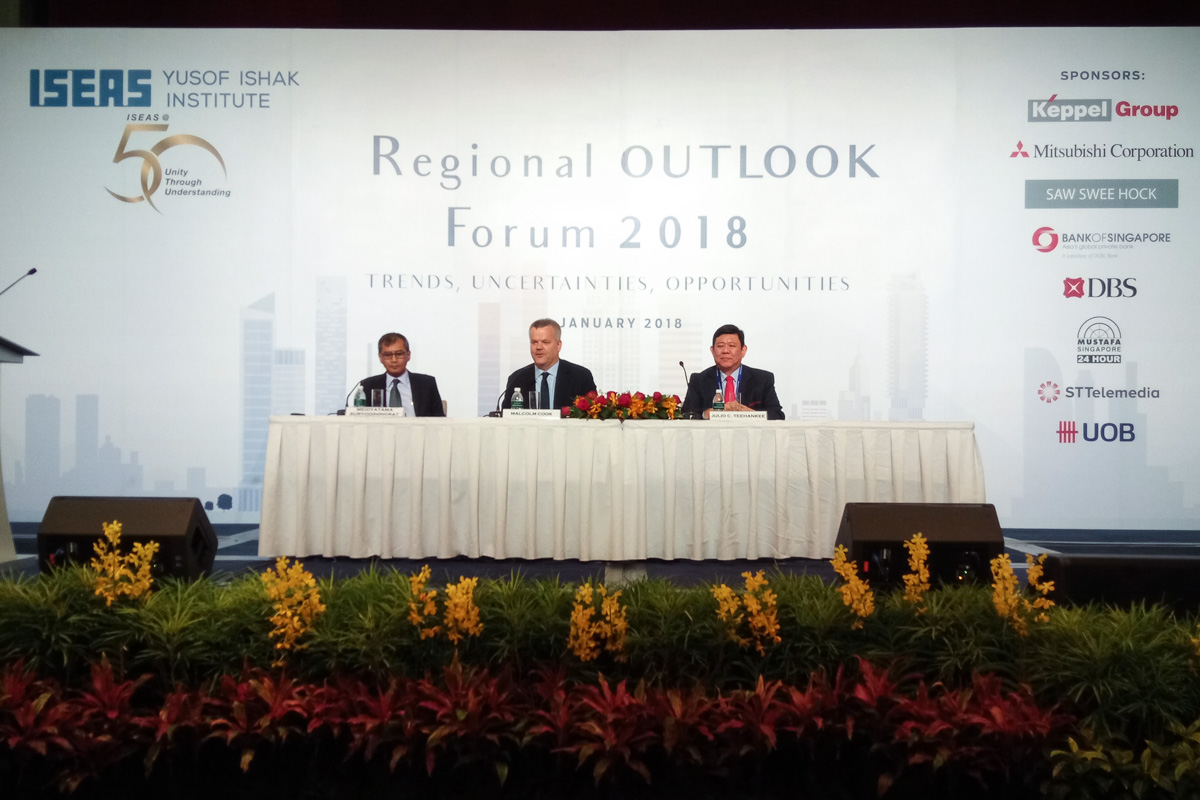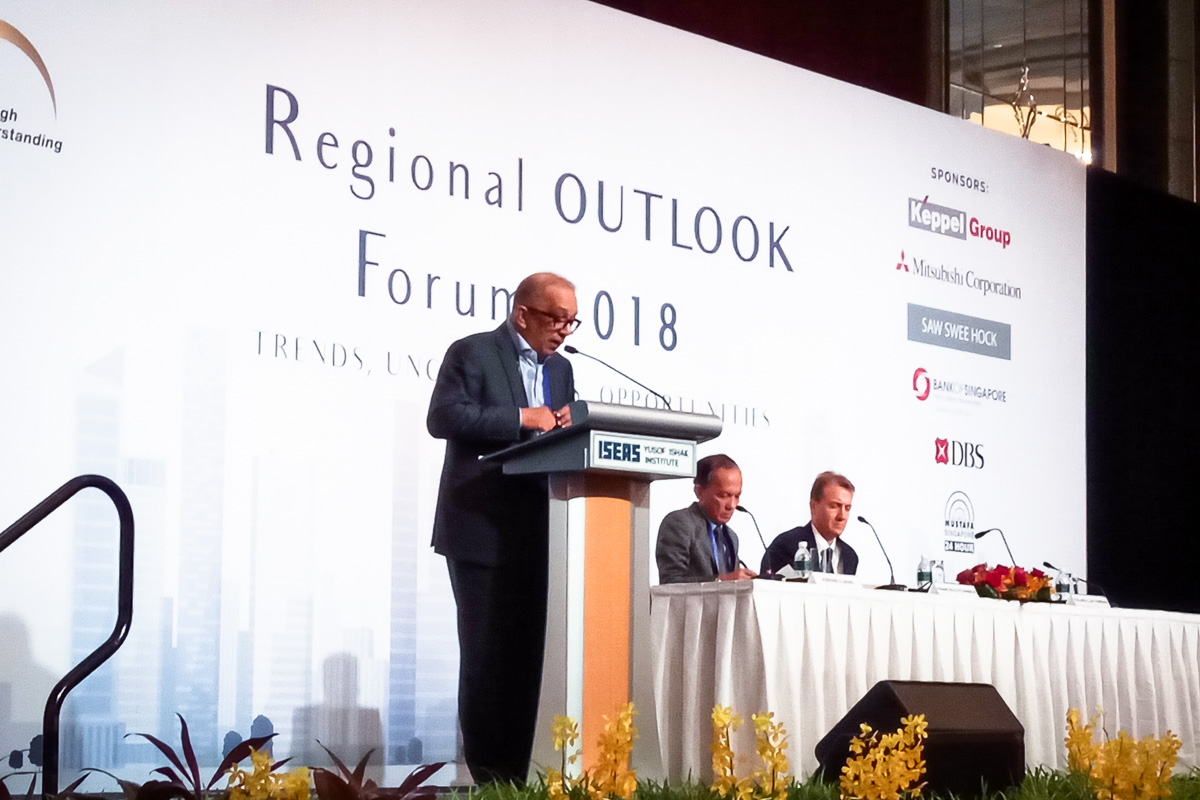The 21st edition of the Regional Outlook Forum (ROF) 2018 – the flagship event of Singapore based ISEAS – Yusof Ishak Institute – was held on Tuesday and attended by industry leaders, academics, diplomats and journalists alike.
The one-day event focussed on macro trends, developments and challenges facing Southeast Asia in the immediate, short and medium-term, and expert insights from a distinguished panel of scholars and intellectuals.
Here are some of the highlights from the discussions that took place:
Implications of US-China relations on the region
Moderated by former ASEAN Secretary General, Ambassador Ong Keng Yeong, the panel discussion centred on the dynamics of Sino-US relations on the region – especially since the election of US President, Donald Trump.
Associate Dean at the School of International Studies in Renmin University, Jin Canrong provided the Chinese perspective on how China is now being perceived by leaders in Beijing as a global power and no longer a regional power.
“We used to be reactive, waiting for our American friends to take the lead and initiate things, but now China's style has changed to becoming more proactive,” he said.
Senior Vice-President for Asia at the Centre for Strategic and International Studies (CSIS), Michael Green said that American confidence on engagement has positively shaped China’s behaviour has declined. Green, who had previously worked at the White House admitted that the current administration’s actions like rescinding from the Trans Pacific Partnership (TPP) has negatively impacted the US in the region.
Nevertheless, there are still avenues for Sino-US cooperation including a historic interdependence and the participation of both powers in organisations like the Asia Pacific Economic Cooperation (APEC). He cited the example of the severe acute respiratory syndrome (SARS) epidemic in 2003 when both countries worked hand in hand in a somewhat rare demonstration of collaboration.
‘The stars are aligned’ for ASEAN economies
ASEAN will continue to prosper economically.
That was the view shared by Razeen Sally, Associate Professor at the National University of Singapore and Manu Bhaskaran, Founding Chief Executive Officer (CEO) of Centennial Group International, the two panellists of the session on “Economic Trends and their Impact on the Region.”
Bhaskaran said that the series of headwinds that ASEAN economies had to endure is now over and “...as consumer confidence recovers, domestic demand will improve.” He cited countries like Malaysia and Indonesia that have promising growth prospects as 2018 continues to unfold.
However, he also warned of risks such as protectionism, the crisis in the Korean Peninsula, financial imbalances and oil price fluctuations that could threaten regional economic prosperity. Nevertheless, if ASEAN economies continue in their strong economic momentum, such risks can be weathered.
Sally also touched on the TPP which has since evolved to become the Comprehensive and Progressive Agreement for Trans-Pacific Partnership (CPTPP).
He was confident that it would be implemented by 2018 after the agreement of an initial framework at the end of last year. Besides being a strong regional trade pact, Sally remarked that it would be an “...agreement ready and fit for the US to re-join,” when political conditions in Washington have shifted.
Countering the IS scare
The crisis in Marawi sparked an interesting discussion into its aftermath and counterterrorism prospects within the region.
Amina Rasul-Bernardo, President for the Philippine Center for Islam and Democracy provided a detailed analysis of the impact of the Marawi crisis on society in southern Philippines. According to her, Muslim communities in Marawi have continued to be marginalised after the altercations between rebel forces and the government last year.
Seven months since the infamous siege, the city has yet to be rehabilitated by the government with many still yet to be resettled back into the obliterated city. She also fears that delays in the passage of the Bangsamoro Basic Law (BBL) – a law signed by the Philippine government and the Moro rebels for the creation of an autonomous political entity – will spark a resurgence of violent extremism.
The BBL has been condemned as a path towards secession. Speaking to The ASEAN Post on the side-lines of the forum, Bernardo rubbished such claims, stating instead that the law will help reinforce the resolve of the affected communities and prevent extremist activities from recurring.
A busy year ahead
The forum also deep-dived into the political situations in Myanmar, Indonesia, Malaysia and Thailand.

From left to right, Meidyatama Suryodiningrat, President Director of Antara News Indonesia, moderator Malcolm Cook, Senior Fellow at the ISEAS – Yusof Ishak Institute and Julio C Teehankee, Professor of Political Science and International Studies at De La Salle University, during the Outlook on Indonesia and Philippines session at the Regional Outlook Forum 2018 in Singapore.
Speaking on the rise of ethnic violence in Myanmar, Thant Myint-U reminded the audience that “...ethnic politics is in the DNA of Myanmar.” Issues of ethnic identity traces its roots further back to the time when Burma (as Myanmar was referred to) was administered as part of British India.
What the country needs, in order to sort out its internal strife is fresh and out-of-the-box thinking. "Change must come from the bottom up,” he added.
Malaysia was also put under the radar. Its citizens will be heading to the polls this year as the incumbent party, Barisan Nasional (BN) will face a renewed opposition coalition, Pakatan Harapan (PH). The panellists, both agreed that BN will likely retain control of the government.
Azman Ujang, Chairman of the Malaysian National News Agency (Bernama) said that disunity amongst the opposition will be the hindering factor towards their ambitions of taking over the reins of government. This would make it easier for BN to retain its position as ruling party.
Kalimullah Hassan, Chairman of ECM Libra Financial Group, expects a BN victory but a loss in popular vote – similar to the previous general election outcome – due to the delineation exercise carried out by the Malaysian Election Commission that is likely to favour the incumbent ruling party.
Indonesia was in the limelight for regional elections in June this year and Presidential elections next year.
“The June elections are very much a barometer for things to come next year,” said Meidyatama Suryodiningrat, President Director of Antara News Indonesia.
Suryodiningrat predicted a two-horse race for the President between incumbent, Joko Widodo and his former rival, Prabowo Subianto.
The political battleground will mainly take place on the island of Java where 56 percent of the electorate reside. New election laws will also likely change the dynamics of the elections.
Thailand’s junta government is expected to call for elections this year. The political fabric of the nation will be put to the test especially since the crowing of its new king, Maha Vajiralongkorn.
According to Thitinan Pongsudhirak, Director at the Thai Institute of Security and International Studies at Chulalongkorn University, the country has seen too many military coups in the past and must strive for a stable democracy. The key may lie in a civil-military power sharing agreement.
“I am excited and worried at the same time – excited to analyse but worried of the outcome,” he said in reference to the possibility of elections this coming year.
Recommended stories:
